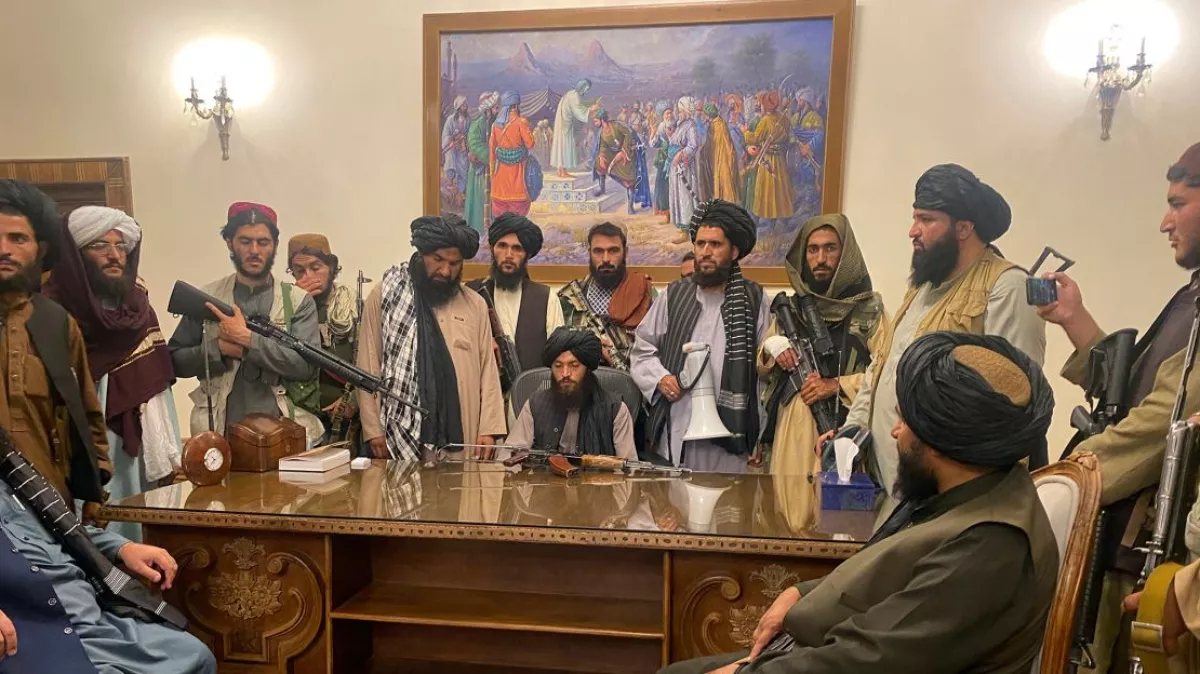Remembering Taliban's dramatic takeover of Kabul 4 years on
The final collapse of the 20-year Western mission in Afghanistan unfolded in just a single day as Taliban fighters entered Kabul on August 15, 2021. President Ashraf Ghani fled the country, and the United States abandoned its embassy amid panic.
The rapid sweep of the Taliban through cities and rural areas the previous week had caught the US military and government off guard. A New York Times article at the time detailed how hastily organized American military helicopter flights evacuated the sprawling US Embassy compound in Kabul, ferrying American diplomats and Afghan Embassy staff to the Kabul military airport.
At the adjacent civilian airport, Afghans cried as they pleaded with airline workers to put their families on outbound commercial flights, most of which were grounded to prioritize military aircraft.
Amid occasional bursts of gunfire, the whump of American Chinook and Black Hawk helicopters overhead drowned out the noise of traffic as the frantic evacuation continued. Kabul’s streets were jammed with vehicles as panic spread and residents raced to flee the city.
Two decades after US troops invaded Afghanistan to root out Al Qaeda, the nation-building experiment was in ruins—undermined by inconsistent policies and a resilient insurgency whose strength had been vastly underestimated by American planners.
Tens of thousands of Afghan civilians perished in the fighting, with thousands more displaced. More than 2,400 US troops lost their lives, and thousands more were wounded, in an effort to build a democratic Afghan government.

America's nation-building exercise
The burden fell especially hard on Afghan security forces in recent years. Yet no amount of American training and equipment—$83 billion worth—was enough to forge a force willing to fight and die for a nation US troops were leaving behind.
In Washington, the speed of the collapse surprised the Biden administration, officials said, leaving it with the recognition that Biden will be remembered as the president who oversaw a humiliating final act in a troubled chapter of American history in Afghanistan.
As US and NATO troops began withdrawing in May, Afghan security forces rapidly crumbled, often surrendering without firing a shot. Many accepted Taliban offers of safe passage and cash, relayed through village elders, and abandoned weapons seized by the Taliban.
“The inability of Afghan security forces to defend their country has played a very powerful role in what we’ve seen over the last few weeks,” then-Secretary of State Antony J. Blinken explained during an interview at the time, as the report recalls.
Search for a scapegoat
Donald Trump frequently calls the chaotic US withdrawal from Afghanistan "the most embarrassing moment in the history of our country."
The pullout was completed in August 2021 under the administration of Trump’s successor, Joe Biden. Since leaving office, Trump has insisted he would have handled the Taliban and withdrawal differently.
Biden has pointed to the February 2020 agreement Trump reached with the Taliban in Doha, Qatar, saying it limited US options and gave the Taliban legitimacy, undermining the government that would collapse a year later.
According to a PBS article, however, the agreement allowed the US to withdraw if Afghan peace talks failed—which they did.
It required US forces to leave by May 1, 2021. Biden extended the deadline to September but refused to delay further, arguing it would prolong a war long overdue to end.
A 2023 US National Security Council review of the chaotic withdrawal largely blamed Trump, saying Biden was "severely constrained" by his predecessor’s decisions.
Yet two retired generals who oversaw the 2021 withdrawal testified before Congress in 2024, pointing to broader responsibility.
Mark Milley, former Joint Chiefs of Staff chairman, and Kenneth McKenzie, former head of US Central Command, provided their first post-retirement testimony on the chaotic pullout.
Republicans held Biden accountable for the exit, while Democrats blamed Trump’s Taliban deal.
The generals avoided siding with either party.
They said both the Biden and Trump administrations, along with previous administrations, played a role in the disastrous withdrawal.
“The Doha agreement— a deal President Donald Trump negotiated with the Taliban that set the terms for the US departure—'pulled the rug out, morale wise' of both the Afghan security forces and government,” Milley said.
But he added that the "fundamental flaw" of the US exit was the Biden administration’s timing in ordering a civilian evacuation in Afghanistan, which he said came "too slow and too late."
By Nazrin Sadigova








